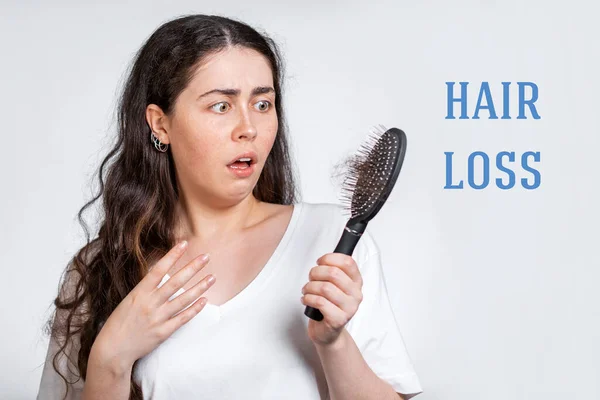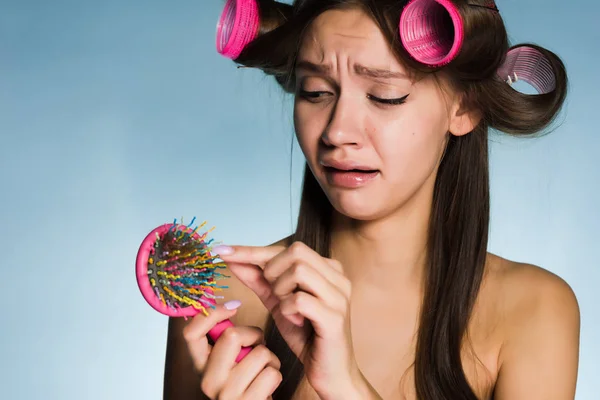Polycystic Ovary Syndrome (PCOS) is a complex hormonal disorder that affects millions of women worldwide. Among its myriad of symptoms, one of the most distressing is PCOS hair loss. This article dives deep into the causes and treatment options for this often-overlooked aspect of PCOS.
Understanding PCOS: A Hormonal Imbalance
PCOS is characterized by an imbalance of reproductive hormones in women, leading to a range of symptoms that can impact both physical and emotional well-being. Some of the hallmark features of PCOS include irregular periods, ovarian cysts, and elevated levels of androgens, which are often referred to as “male hormones.”

Key PCOS Symptoms:
- Irregular Menstrual Cycles: Ovulation may not occur regularly, leading to missed or irregular periods.
- Ovarian Cysts: Fluid-filled sacs in the ovaries.
- Hyperandrogenism: Elevated levels of androgens, such as testosterone.
- Hirsutism: Excess hair growth in areas where men typically grow hair, like the face and chest.
- Acne: Skin breakouts, often due to increased androgen levels.
- Hair Loss: Thinning of the scalp hair, a condition known as PCOS hair loss or androgenic alopecia.
Also Read | Disadvantages of Teeth Cleaning: The Importance of Regular Dental Cleanings for Overall Health
The Science Behind PCOS Hair Loss
PCOS hair loss, also known as androgenic alopecia, results from the excess androgens commonly found in women with PCOS. These androgens can lead to a condition known as miniaturization of hair follicles. Here’s how it works:
- Miniaturization: Excessive androgens cause hair follicles to shrink over time, resulting in thinner, finer hairs.
- Shortened Growth Cycle: The growth phase of the hair (anagen) becomes shorter, leading to decreased hair length.
- Increased Shedding: Follicles in the resting phase (telogen) become more numerous, leading to increased hair shedding.
- Pattern Hair Loss: This process typically follows a pattern, with hair thinning occurring at the crown of the head and the front hairline.
PCOS Hair Loss Treatment Options
While there is currently no cure for PCOS hair loss, several treatment options are available to manage and improve the condition. The choice of treatment depends on the severity of hair loss, individual preferences, and medical history. Here are some effective strategies:
1. Lifestyle Modifications
- Healthy Diet: A balanced diet that focuses on whole foods and avoids excessive sugar and processed carbohydrates can help manage insulin resistance often associated with PCOS.
- Regular Exercise: Physical activity can improve insulin sensitivity and help regulate hormone levels.
- Stress Management: Stress can exacerbate PCOS symptoms, including hair loss. Practices like yoga, meditation, and deep breathing can be beneficial.
2. Medications
- Oral Contraceptives: Birth control pills containing estrogen and progestin can help regulate menstrual cycles and reduce androgen levels, which may slow down hair loss.
- Anti-Androgen Medications: Spironolactone and finasteride are sometimes prescribed to block the effects of androgens on hair follicles.
- Topical Minoxidil: Over-the-counter minoxidil solutions can promote hair growth and thicken existing hair.
3. Medical Procedures
- Platelet-Rich Plasma (PRP) Therapy: PRP involves injecting your blood’s concentrated platelets into the scalp to stimulate hair follicles.
- Hair Transplantation: In cases of severe hair loss, hair transplantation surgery can restore a fuller head of hair.
- Laser Therapy: Low-level laser therapy (LLLT) devices can stimulate hair follicles and promote hair regrowth.
4. Dietary Supplements
- Biotin: Biotin, a B-vitamin, is often recommended to strengthen hair and nails.
- Iron: Iron deficiency can exacerbate hair loss, so supplements may be necessary if blood tests reveal a deficiency.
5. Cosmetic Solutions
- Wigs and Hairpieces: For immediate cosmetic improvement, wigs and hairpieces can be worn to conceal hair loss.
Preventing PCOS Hair Loss: Early Intervention Matters
Early intervention is crucial for managing PCOS hair loss effectively. If you suspect you have PCOS or are experiencing hair thinning, consider consulting a healthcare professional. Timely diagnosis and treatment can help slow down hair loss and improve hair thickness.
You may also like | List of The Best Treadmills Brands In the United States for Home Use
Conclusion: A Holistic Approach to PCOS Hair Loss
PCOS hair loss can be emotionally distressing, but it’s essential to remember that you’re not alone in this journey. With the right combination of lifestyle changes, medications, and procedures, it’s possible to manage and even improve the condition of your hair. Additionally, seeking support from healthcare professionals and support groups can provide valuable guidance and emotional support as you navigate the challenges of PCOS. Remember, your beauty and confidence are not defined by your hair, but by the strength and resilience you exhibit in the face of adversity.
FAQs – PCOS Hair Loss
Q: What are the most effective treatments for PCOS hair loss?
A: The most effective treatments for PCOS hair loss will vary depending on the individual. However, some of the most common and effective treatments include:
- Birth control pills: Birth control pills can help to regulate hormones and reduce hair loss.
- Antiandrogens: Antiandrogens are medications that block the effects of androgens, the hormones that can cause hair loss in women.
- Spironolactone: Spironolactone is a medication that can help to reduce hair loss and excess hair growth.
- Minoxidil (Rogaine): Minoxidil is a topical medication that can help to promote hair growth.
- Hair transplantation: Hair transplantation is a surgical procedure that involves transplanting hair follicles from another part of the body to the scalp.
Q: What lifestyle changes can help to improve PCOS hair loss?
A: Making lifestyle changes, such as eating a healthy diet, exercising regularly, and managing stress, can also help to improve PCOS hair loss.
- Eat a healthy diet: Eating a healthy diet can help to improve hormone balance and reduce inflammation. Focus on eating plenty of fruits, vegetables, and whole grains. Avoid processed foods, sugary drinks, and excessive amounts of saturated and unhealthy fats.
- Exercise regularly: Exercise can help to improve insulin sensitivity and reduce inflammation. Aim for at least 30 minutes of moderate-intensity exercise most days of the week.
- Manage stress: Stress can worsen PCOS symptoms, including hair loss. Find healthy ways to manage stress, such as exercise, yoga, or meditation.
Q: When should I see a doctor for PCOS hair loss?
A: You should see a doctor if you are concerned about PCOS hair loss, especially if you are experiencing any of the following:
- Excessive hair loss
- Thinning hair on the scalp
- Hair loss in a male-pattern baldness pattern
- Excessive hair growth on the face and body
Your doctor can help you to determine the underlying cause of your hair loss and recommend appropriate treatment options.
Also Read | Dealing With Itchy Scalp? Follow These Easy Tips To Say Goodbye To It






